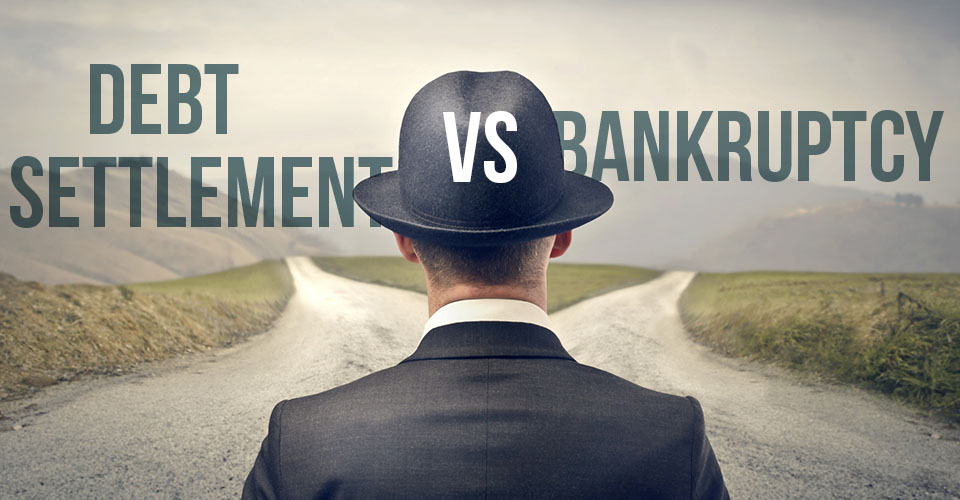
In these uncertain times debt can be a scary proposition for anyone. When your debts become overwhelming, you begin searching for relief. Debt settlement and bankruptcy are solutions to the same problem – What are the most direct methods for getting out of debt? — but they can take very different tolls on your future financial well-being. If your debts are so massive that you can’t imagine repaying them, it’s time to consider both options.
Bankruptcy can offer the fastest path out of debt, but the long-term impact on your creditworthiness is severe. A bankruptcy will stay on credit reports from seven to 10 years, which will greatly impede your ability to get a loan, receive a credit card or buy a home. Bankruptcy, which is adjudicated in federal court, either wipes out your personal debt (Chapter 7) or creates a plan for repaying creditors (Chapter 13).
Debt settlement doesn’t require a court filing and, unlike bankruptcy, can often be handled without a lawyer or financial counseling. A settlement is a deal you negotiate with creditors to pay less than the amount owed.
Why would creditors want to settle your debts for less than you owe?
They know that you can always file for bankruptcy, which could eliminate their ability to collect anything from you. So, they are frequently willing to accept less than they are owed through debt settlement.
If you conclude that you can’t even afford debt settlement, bankruptcy could be the best option.
Personal bankruptcy comes in two varieties: Chapter 13 is essentially a payment plan that takes three to five years; Chapter 7 clears your personal debts but comes with potential pitfalls. If you own a home, you will be able to keep it under Chapter 13, though you will need to make mortgage payments after you exit bankruptcy court. Chapter 7 doesn’t offer that guarantee. Some states allow bankruptcy trustees to sell your home to raise money to repay creditors. Chapter 7 also has income limits that requires you make less than your state’s median income for a family your size.
Bankruptcy frees you from debt collection, but the headaches can linger for years. Debt settlement without bankruptcy can take more time, but if negotiated properly can do far less damage to your credit. Understanding the pros and cons of debt settlement vs. bankruptcy and making the smartest choice can have a big impact on your future finances.
Choosing Debt Settlement or Bankruptcy
Impact of Bankruptcy and Debt Settlement on Credit
Both bankruptcy and debt settlement can have an adverse impact on your creditworthiness and can lower your credit, or FICO, score for years. Bankruptcy, no matter which chapter you file under, is certain to bring down your score. The better your score is to begin with, the more it will drop.
A Chapter 7 bankruptcy remains on your credit report for 10 years from the date of filing; a Chapter 13 stays on the report for seven years. Accounts associated with a bankruptcy or debt settlement are removed from your report seven years after they initially become delinquent.
Bankruptcy laws regulate what happens to your money when your case is settled. Chapter 7 cases typically clear your debts, while Chapter 13 requires partial repayment. A bankruptcy judge will decide how much you need to repay based on laws in your state.
Debt settlement typically requires that you make a lump sum payment to clear your account. If you are unable to pay that amount right away (most people in default can’t), you’ll have to stop paying your credit card bills until you save enough to settle the debt. Stopping payment can further damage your credit and expose you to late fees, additional interest charges, collection efforts and lawsuits.
The possible advantage to settlement is that in exchange for a payment, creditors will sometimes agree not to report the settlement to the three major credit-rating bureaus. Your earlier credit problems probably have damaged you credit score, but if the settlement isn’t reported, it may take less time to rehabilitate your credit score.

Advantages to Chapter 7 bankruptcy:
- Clears most debts and offers a financial fresh start.
- Doesn’t require the filer to pay taxes on unpaid debts.
- Prevents creditors from pursuing collections.
Disadvantages to Chapter 7 bankruptcy:
- Damages credit report for 10 years.
- Some states allow seizure and sale of you home and other properties. You should review what is exempt in your state.
- Requires that you wait eight years before filing again under Chapter 7.
Advantages to Chapter 13 bankruptcy:
- Protects your property, including your house and car, from foreclosure and repossession to cover debts.
- After you complete required payments, you receive a discharge of debt.
- You aren’t required to pay taxes on forgiven debt.
- Waiting period before you can file again is two years – six years less than under Chapter 7
Disadvantages to Chapter 13 bankruptcy:
- Requires that you follow a court-ordered payment plan that lasts three to five years.
- Reduces your credit score for years, making it difficult to borrow money or obtain credit.
Other Considerations:
Learn how long bankruptcies stay on your credit report. Before any lender extends you a loan, they will pull your credit report. Accordingly, you want your credit report to look as good as possible. Unfortunately, your bankruptcies will stay on your reports for years.
- A chapter 7 stays on your report for 10 years after you file. Your credit score can fall 150 points or more. The higher your score, the more it will fall.
- A Chapter 13 stays on your report for seven years after you file. Your credit score will also be lowered.
Understand the effect of debt settlement on your credit report. Debt settlement negatively affects your credit report because you typically stop making payments to your creditors as you save up money to make a lump sum offer. (If you can save money while continuing to pay your monthly debts, then you probably don’t need to consider debt settlement or bankruptcy in the first place).
- By missing payments, your creditors will probably report the debt as in default. If you wait long enough (such as 180 days), the debt gets charged off and sold to collections. This type of negative information will stay on your credit report for years. For example, a collections account can stay on your report for seven years.
- However, creditors don’t have to report negative information to the credit bureaus. Instead, you might negotiate an agreement where they won’t report it.
Contact Us:
We understand debt settlement and bankruptcy is a challenging topic to face both financially and emotionally. The processes can become very complicated in a system that is difficult to navigate and frequently changes. Consulting with a good lawyer as soon as possible is incredibly important to the success of your debt settlement or bankruptcy strategy. At JLG Lawyers we offer solutions to help advise you and answer questions all the way to a full attorney handled case. Contact us now for a free case review and strategy session.
JLG Lawyers and Michael Jaurigue, Esq. are located in Glendale, California and specialize in debt settlement and bankruptcy matters. Michael Jaurigue is a UCLA and Berkeley Law graduate and has been practicing law for 20 years in Los Angeles and worked at Sheppard, Mullin, Richter, and Hampton representing several Fortune 100 clients prior to forming his own firm 10 years ago. JLG Lawyers is located at 300 W Glenoaks Blvd. Suite 300, Glendale, California 91202. 818-630-7280.

